OEMs Or Software Companies: Who Will Control The Data?
- By Juili Eklahare
- September 14, 2022
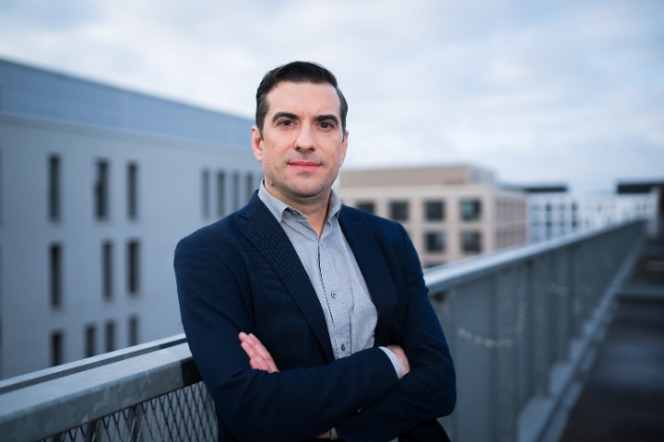
Software is finding a growing presence in cars today, which will eventually get upgraded over time. In fact, over the years, car manufacturers have invested millions in the R&D of automotive software. And automotive OEMs are competing with tech giants to produce operating systems for the car. Ivo Ivanov, CEO, DE-CIX International, discusses why OEMs need to be in control of the data journey of their cars, why the type of usage of the car or the special mobility packages will become more essential down the line and if there really will be a software war in the near future.
The cars of the future will be highly interconnected, and we’ll see real-time data exchange. A couple of years ago, automotive OEMs were focused on the engine, shape, the mechanical part of the car etc. However, they have now understood that the digital part of this business will drive them more successfully into the next century. There is a huge appetite for control of data by the OEMs, not just of the software but the infrastructure as well.
In fact, automotive companies have already started turning into software companies. Ivo Ivanov, CEO, DE-CIX International, mentions that automotive OEMs plan to create an independency from operating systems like iOS or android, so as to have their own software-driven platform – and this is valid for all major automotive companies, from Honda to Toyota, which is a market reality. At the same time, we also see automotive OEMs partner with companies like Google or Amazon, because of their cloud capabilities. While this sure is the case, it doesn’t tell us that the automotive OEMs will stop creating their software independency.
“If you ask me about software, I truly believe that we will see the so called ‘software war’ in the near future,” Ivanov expresses and continues, “They will collaborate if it comes to cloud resources and cloud computing resources for their manufacturing platforms. However, if it comes to creating and increasing the control of the data gateway related to the digital car, then we will definitely see a future competition between the propitiatory software developments of companies like Volkswagen, BMW etc. (you name them) and the established operating system providers like Apple or Google.”
OEMs in control of the data journey – why is it needed?
While the automotive OEMs can easily go to the software companies, it comes down to who controls this. “If the software related to the car remains in the hands of the existing players, then the OEMs will have to share a bigger portion on the assets with those companies,” Ivanov enlightens and adds, “They can share if needed, but the question remains of who has the majority in that stake. They want to increase their margin on the digital assets related to the car and become the major stakeholder in that domain.”
Ivanov further informs that, moreover, those who want to be extremely successful in the future must make themselves capable of doing this. “Because if they do not create this controllability of the data journey, they will not be able to create digital assets,” he puts across and adds, “An OEM can grow its value as a company on the stock exchange if it is able to provide the market with a story that is futuristic and can create a value in the future. And the OEMs will not be able to differentiate in the future with the quality of the car seats, engines, shape of the car etc. alone – they will be able to differentiate with smart digital concepts for mobility solutions in our digital lives.”
Citing a relevant example in this context, he asserts, “Let’s think about the metaverse, or the truly and entirely digitalised environment; we see companies like McLaren and Porsche that have already started creating their digital twins for the metaverse. It eventually comes down to access to the customers. The OEMs have the cars and the customers are the users of the cars.”
OEMs developing their own software – is it safe?
However, even companies like Tesla have their share of failures in vehicle software, with there being investigations into Tesla’s driver enhancement software following a spell of documented malfunctions. So, what can one say when it comes to smaller OEMs?
“It’s a normal process of improving your code, its security and the software. It’s what Microsoft, Apple, Google etc. have been dealing with for decades now. In fact, the OEMs will catch up much faster because they have the money to make sure that they hire efficient people and acquire other companies. And also, again, they have access to the end-users,” explains Ivanov.
Control of the data journey and infrastructure
The OEMs have the cars, the customers and the users of the car. These OEMs want to control the framework and will integrate existing solutions and other elements but want to be in control of the data journey, which is the asset. “The assets are the tonnes of data produced by the car,” Ivanov shares and goes on, “Hundreds of thousands of organisations around the world are trying to get involved in this huge and tremendous business surrounding data – the data getting into the car and the data being produced in the car. This is what the OEMs aim for.” Ivanov further clarifies that the OEMs will probably not write the code for everything from zero, but they sure will want to control the framework. “But the knowledge of where exactly the data comes from in the car and where the data goes from out of the car, then they will be able to turn themselves into the gatekeepers of the data journey and create their virtual and digital assets around this driver behaviour. And I believe that it’s not the ownership of the car in terms of legal rights of owning the car, but the type of usage or the special mobility packages that will become more essential.”
Not just software, but chips too
According to market research firm Gartner, by 2025, fifty percent of the top 10 automotive OEMs will design their own chips. Ivanov envisions that what we have seen with the battery production for electric cars, will happen in the case of chips too. “All of the dominant OEMs, from Tesla to BMW to Mercedes to Volkswagen, have already started heavily investing in their own battery manufacturing assets. In some cases, they collaborate with existing battery manufacturers, or in other cases, they create their own battery factories,” Ivanov asserts and adds, “So we see a similar development in the chip industry. That’s because the chips in the connected car and the whole mobility concept around the future of OEMs are nothing but the new engine.”
A leading position
Software is certainly transforming the automotive world. And yes, major automotive OEMs are now seriously investing in new software platforms. The software and infrastructure together, undoubtedly, will empower automotive OEMs to be the gatekeepers in this data journey and provide them with the level of controllability of the data journey that they need to create virtual and digital assets for their shareholders. Software is definitely one of the main differentiators, creating a leading position in automotive OEMs.
Mahindra Reports Consolidated PAT Of INR 46.75 Billion For Q3 FY2026
- By MT Bureau
- February 11, 2026
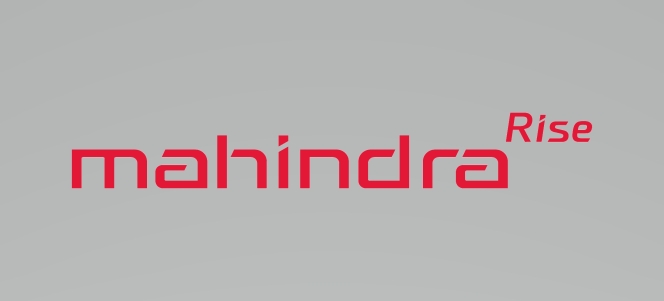
Mumbai-headquartered automotive major Mahindra & Mahindra (M&M) has announced its financial results for Q3 FY2026, reporting a consolidated Profit After Tax (PAT) of INR 46.75 billion, representing a 54 percent YoY growth.
The automotive division recorded quarterly volumes of 302,000 units, up 23 percent YoY. SUV revenue market share rose by 90 bps to 24.1 percent. The automotive business reported consolidated revenue of INR 303 billion, up 30 percent YoY, while PAT stood at INR 19.93 billion, up 42 percent YoY.
In the farm sector, tractor volumes reached 150,000 units, up 23 percent YoY, which translates to a market share of 44 percent for Q3. The revenue came at INR 115 billion, up 21 percent YoY, while PAT came at INR 10 billion, up 7 percent YoY.
Dr. Anish Shah, Group CEO & Managing Director, said, “We are delighted to report solid operating performance across the group in Q3’F26, reflecting our strong focus on growth coupled with disciplined execution. Auto & Farm has maintained its leadership position on the back of steady customer demand, strong product acceptance and unwavering focus on operational excellence. TechM continues to make meaningful progress. Mahindra Finance delivered another solid quarter with meaningful PAT growth while maintaining strong asset quality. We are especially pleased to see breakout performance from two of our growth gems, Mahindra Logistics and Mahindra Lifespaces.”
Rajesh Jejurikar, Executive Director & CEO (Auto and Farm Sector), said, “Auto and Farm businesses delivered strong performance in Q3’FY26. We have achieved a 90 bps YoY increase in SUV revenue share and 10 bps YoY increase in LCV (< 3.5T) market share in Q3. Our tractor business gained 20 bps YoY to reach an impressive 44.1 percent share for YTD FY26. Our new launches XEV 9S, and the XUV 7XO have received very positive response in the market.”
Amarjyoti Barua, Group Chief Financial Officer, added. “Our Q3 consolidated results reflects the strength and depth of our diversified portfolio. Our services businesses continue to increase their contribution to the overall results. Our results are also translating into a very strong Balance Sheet.”
- CEER
- Saudi Arabia
- Abdul Latif Jameel
- Zamil Trade & Services
- Zamil Plastics
- NSSPC
- KK Nag
- Mino
- FEV
- AVL
- MK Tron
- XYG
- Sika
- AITS
- FPI
- James DeLuca
CEER Inks 16 Agreements Worth USD 996 Million To Expand Saudi EV Supply Chain
- By MT Bureau
- February 10, 2026

CEER, Saudi Arabia’s first electric vehicle (EV) brand and Original Equipment Manufacturer (OEM), has signed 16 commercial agreements valued at over SAR 3.7 billion (USD 996.90 million). The deals were announced at the 4th PIF Private Sector Forum, following SAR 5.5 billion (USD 1.4 billion) in agreements secured at the previous year's event.
The partnerships are part of a localisation strategy that aims to source 45 percent of vehicle materials and components from Saudi companies by 2034. The supply chain will support CEER’s production plan of seven models over the next five years.
The agreements cover a range of essential automotive components and services:
- Fluids and Plastics: Abdul Latif Jameel (ALJ) will supply windshield washer fluid and EV coolants. Zamil Trade & Services and Zamil Plastics will provide brake fluids and aerodynamic covers.
- Materials and Polymers: NSSPC is contracted for PP resin and polymer compounds, while KK Nag will provide Expanded Polypropylene (EPP).
- Engineering and Infrastructure: Mino will install steel Body Shop equipment. FEV and AVL will provide engineering services.
- Manufacturing: MK Tron will produce small stampings, window regulators, and door hinges. FPI will supply front-end modules and XYG will provide glazing solutions.
- Chemicals and HVAC: Sika is contracted for structural adhesives and cavity baffles, while AITS will work on HVAC localisation.
The project is expected to contribute SAR 30 billion (USD 8 billion) to Saudi GDP by 2034 and improve the trade balance by SAR 79 billion (USD 21 billion). CEER estimates the creation of 30,000 direct and indirect jobs, aligning with the industrial diversification goals of Saudi Vision 2030.
James DeLuca, CEO, CEER, said, “These agreements are a cornerstone of CEER's wide and deep localisation strategy, which targets sourcing 45 percent of vehicle materials and components from Saudi companies by 2034. Our approach goes beyond mere assembly, we are utilising local raw materials and empowering Saudi companies to become global suppliers, directly contributing to Vision 2030’s mission to diversify the national automotive industry and drive sustainable economic growth.”
“These agreements represent a major step in building a comprehensive automotive ecosystem in the Kingdom. By using local materials and resources, attracting advanced technology and foreign investment, and localising the production of heavy and labour-intensive components, we aim to reduce CO2 emissions and create meaningful job opportunities for Saudi nationals,” added DeLuca.
Cars24 Introduces Refreshed Brand Identity
- By MT Bureau
- February 09, 2026
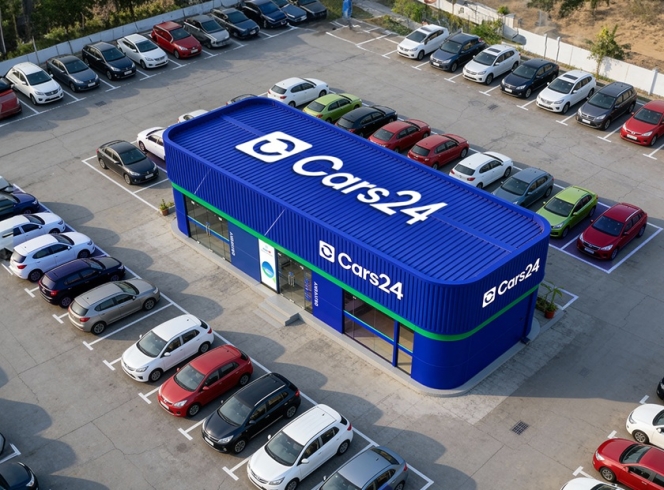
Cars24 has unveiled a refreshed brand identity, moving from its original transactional focus towards a car ownership ecosystem.
Founded in 2015, the company originally utilised an all-caps logo – CARS24 – to establish a presence in a fragmented market. The updated identity shifts the name to sentence case, Cars24, which the company states reflects maturity and a focus on trust.
The core of the redesign features an open circular logo. According to the company, this form represents the continuity of car ownership, where vehicles change hands and user needs evolve. The open shape is intended to signal flexibility rather than closure.
The brand has also replaced its traditional blue with a brighter shade. This ‘younger blue’ is intended to make the brand appear more attentive and human as it scales its operations.
The identity update was the result of over 1,200 hours of design and iteration. The goal of the project was to create a look that remains relevant as the company expands its services beyond buying and selling into broader ownership systems.
Vikram Chopra, Founder & CEO, Cars24, said, “When we started, being loud helped. But as the company and the team grew up, the work started speaking for itself. This change is about reflecting who we are today, calmer, more human and focused on earning trust over time.”
Maruti Suzuki India Increases Rail Dispatches To 585,000 Units, Up 18% In 2025
- By MT Bureau
- February 09, 2026
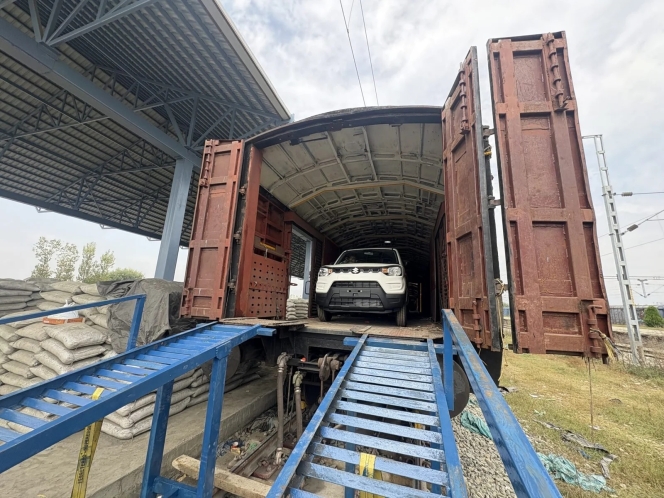
Maruti Suzuki India, the country’s largest passenger vehicle manufacturer, has reported the dispatch of over 585,000 vehicles using the railway network in CY2025, which marked an 18 percent growth compared to CY2024.
Over the last decade, the company's use of rail for outbound logistics has risen from 5.1 percent in 2016 to approximately 26 percent in 2025. The shift aims to reduce carbon emissions, oil imports and road congestion.
In 2025, Maruti Suzuki India inaugurated an in-plant railway siding at its Manesar facility. The company also became the first manufacturer to dispatch vehicles to the Kashmir valley using the railway bridge over the Chenab river.
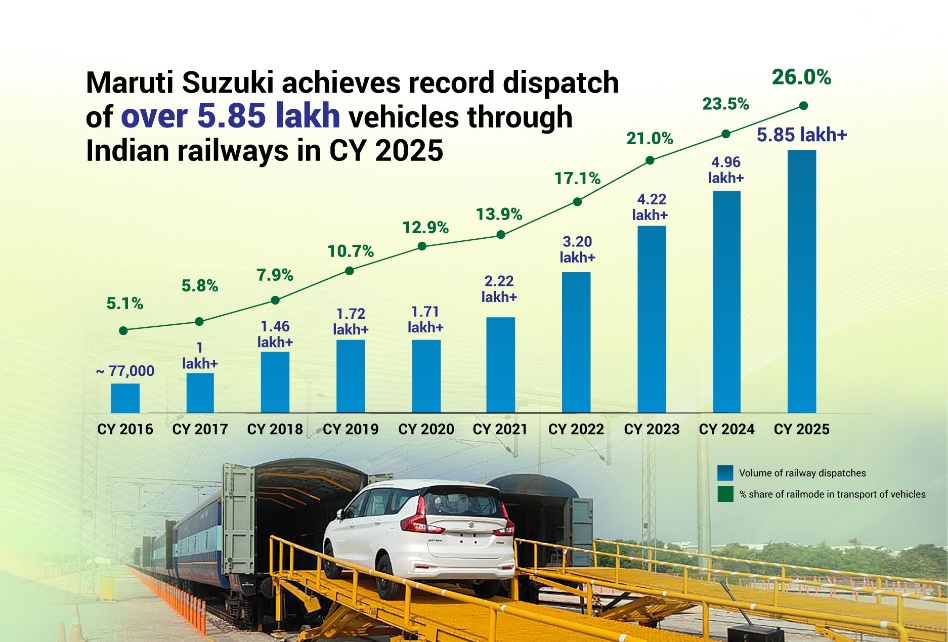 Combined dispatches from in-plant sidings at Gujarat and Manesar accounted for 53 percent of the company's total rail volumes during the year. The manufacturer currently employs 45 flexi-deck rakes, with each train capable of transporting approximately 260 vehicles.
Combined dispatches from in-plant sidings at Gujarat and Manesar accounted for 53 percent of the company's total rail volumes during the year. The manufacturer currently employs 45 flexi-deck rakes, with each train capable of transporting approximately 260 vehicles.
The company was the first automaker to receive an Automobile-Freight-Train-Operator (AFTO) license in 2013. Since FY2014-15, it has transported more than 2.8 million vehicles to 600 cities using a hub-and-spoke model.
Hisashi Takeuchi, MD & CEO, Maruti Suzuki India, said, “The year 2025 marks our highest-ever rail dispatch, with over 585,000 units. During the year, we strengthened our green logistic efforts through two landmark events – the inauguration of India’s largest automobile in-plant railway siding at our Manesar facility and second was we dispatched vehicles by rail to Kashmir valley through the world's highest railway arch bridge over Chenab river, a first by any automobile manufacturer. Our mid-term goal is to increase rail-based vehicle dispatches to 35 percent by FY 2030-31, contributing to India’s net-zero ambition by 2070. Maruti Suzuki India has adopted a comprehensive ‘Circular Mobility’ approach to sustainability, aiming to reduce its carbon footprint across the entire vehicle lifecycle – from design and production to logistics and end-of-life vehicle (ELV) management.”







Comments (0)
ADD COMMENT